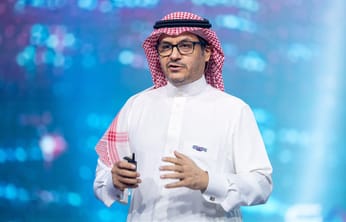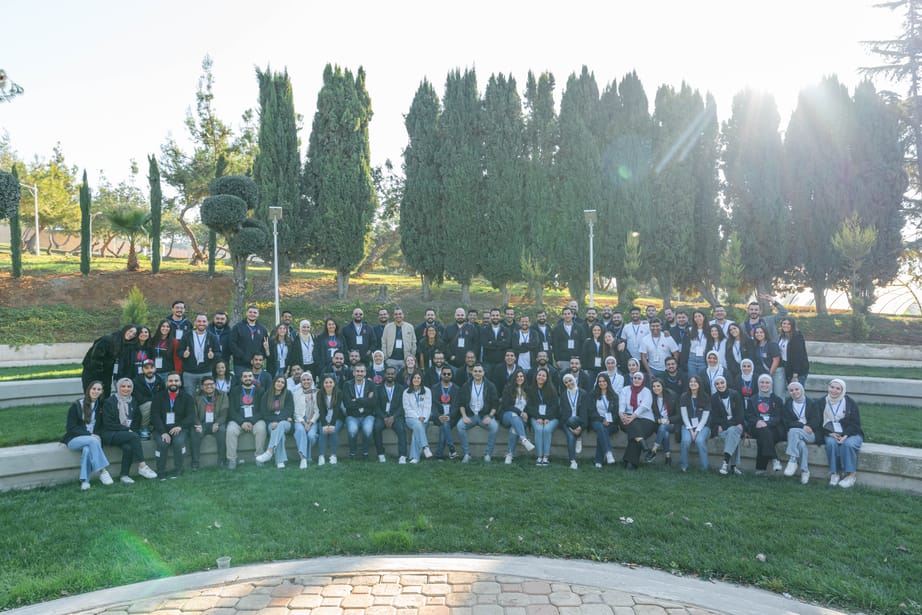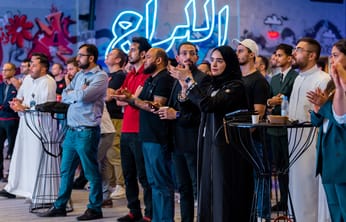
The Best Is Yet To Come
Saudi Arabia’s AI revolution is only just getting started, says Dr. Yaser Al-Onaizan, CEO of the National Center for

(And its economic impact is set to move from being mere pixels to tangible prosperity)
BY DEVINA DIVECHA
The global gaming market was valued at anywhere from US$225 billion and $250 billion in 2022, depending on which report you look at- and projections state that it will be worth more than $600 billion by 2030. Whichever way you look at it, it’s a lucrative business.
Looking to level up in this field is the Kingdom of Saudi Arabia- and this should come as no surprise with the nation’s Vision 2030 aiming to diversify beyond oil. The National Games and Esports Strategy hopes to make the country a global gaming hub by 2030, and concrete steps have been taken to achieve that. From the formation of Savvy Games Group, backed by the Public Investment Fund (PIF), and launching the Saudi Esports Federation, to becoming the biggest outside investor in Nintendo (currently holding 8.26% of shares), and acquiring stakes in Korean-founded gaming company Nexon and American game maker Activision Blizzard- there has certainly been plenty of activity.
PIF’s Savvy Games Group has earmarked $39 billion to inject into the gaming industry, with the aim of establishing 250 companies in the sector over the next six years, and create upwards of 40,000 jobs. The group has already made forward moves, purchasing the likes of American game creator Scopely and UK-based ESL FACEIT, and investing in Chinese esports startup VSPO. And there’s a lot more brewing.
The Saudi Arabian gaming market is, therefore, not one to twiddle one’s thumbs at. Boston Consulting Group’s Game Changer report released in June 2023 shows that Saudi Arabia represents approximately 45% of the Middle East and North Africa’s gaming market with a value of $1.8 billion. Furthermore, the 2023 Saudi Gaming Market Outlook report released by AstroLabs in partnership with asset management firm IMPACT46 and esports platform PLAYHERA showed that 81% of surveyed gamers and developers are optimistic about the growth of the industry in the coming year, with more than 60% attributing this growth to the state investment in the sector.
From the consumer perspective, gaming is a cultural phenomenon. “With around 70% of population under the age of 35 and around 23.5 million gamers comprising about 67% of the total population, gaming has become a staple of the daily lives of many Saudis,” says Ralf Reichert, CEO of the Esports World Cup Foundation. “This surge in gaming is not limited to traditional demographics; nearly half of new gamers in the country are women. Events like Gamers8, which attracted over 1.4 million visitors to Riyadh and tripled global viewership year-over-year, highlight gaming’s immense popularity and cultural impact in the Kingdom. Furthermore, the Saudi government’s plan to invest over $6.4 billion in future technologies, including esports and gaming, emphasizes the sector’s significance in both the cultural and economic realms. Key local players, like Savvy Games Group, have invested heavily in the landscape, and 75% of their allocated funds have still yet to be deployed– signaling that the growth won’t stop anytime soon.”
MULTIPLAYER MENTALITY
The mandate to launch local gaming companies and create jobs, as well as produce games that Saudi Arabian nationals and the wider region can identify with, has meant the widespread support of establishing companies and training people in the ecosystem. Additionally, 51% of those surveyed for the Astrolabs report believe that there is a high demand for locally developed mobile games. This is evident in the rise and success of local developers.
One such firm involved in this sphere is asset management company Merak Capital, which is actively promoting local game development. To this end, amid the staging of the seventh edition of the Future Investment Initiative in October 2023, the firm also hosted a Gaming Investment Night, in collaboration with the Ministry of Communications and Information Technology of Saudi Arabia (MCIT) and gaming-focused venture capitalist firm Griffin Gaming Partners. The event, attended by industry leaders, showcased the potential of the Saudi gaming sector, and it also served as a platform for discussing business opportunities, trends, and the future of gaming in the Kingdom.
Ahmed AlJabreen, Partner in Merak Capital, notes that the government support for this industry will result in tangible results, saying, “There will be programs that cover entire funding cycles from seed, and perhaps pre-seed where the entire value chain is covered. We believe that this strategy eventually will create an ecosystem that is able to organically produce heavy hitter AAA games [high-budget games with prominent marketing, typically created by large publishers] that appeal to a worldwide audience. These are going to be created by Saudi-based people, supported by Saudi-based people, and funded by Saudi-based people... It’s not only going to create economic sense, it’s going to create social sense.”
AlJabreen also emphasizes the importance of telling stories through games that resonate with the local audience, especially when it comes to challenging the historical portrayal of Middle Eastern characters in global games. “I grew up playing games where the villain was somebody who looked like me, and I had to shoot this guy to progress to the next level,” AlJabreen says. “Looking back, it made me uncomfortable. As a kid, it made me feel disconnected from my culture, to hear stories about my culture from a different perspective that wasn’t necessarily favorable.”
But AlJabreen notes that change is happening in this regard. “We went to demo days supported by Ignite [the initiative being driven by Saudi Arabia’s Digital Content Council to boost the Kingdom’s participation in the online content sphere] and MCIT, and looking at the early productions of games- the feeling when you see someone who looks like you, talks like you, and is actually interesting, and not just a side note in the game [was exhilarating].”
On this front, Abdulelah Alshareef, Senior Investment Associate at Merak Capital, also notes the building blocks that are aiding the growth of the game development ecosystem in the Kingdom. “The Saudi Digital Academy (SDA) is doing an amazing job by teaching people game development, game design, graphics, and all the aspects of the supply chain that goes into gaming,” he says. “I remember there was a game development bootcamp seven years ago, where there were the first steps at trying to reach people who are passionate about game development. When I look at the size of what we had then, and what we have right now, [the industry has] immensely grown- through Ignite and MCIT with their incubation programs, acceleration and investments programs, education program, their graphics lab, virtual reality and augmented reality labs and their work with universities. The Esports Federation is teaching people how to be coaches. On the commercial side, when you look at what Savvy Games Group is doing with Steer Studios [its game development studio], and the knowledge transfer that’s happening with top tier talent across the world coming to Saudi through Savvy, it’s very exciting to see.”
Reichert doubles down on the significance of this development. “The establishment of structured esports leagues and tournaments offers professional avenues for gamers, and creates clear paths to pro play, further legitimizing esports as a career,” he says. “At the same time, educational platforms and gaming academies are emerging, nurturing the next era of talent.” However, viewing gaming as a career option is still in its nascent phases- according to the Astrolabs’ report, 33% of professional gamers earned some form of income f rom content, while 58% of respondents said they were not generating consistent or sporadic income from gaming professionally just yet.
Meanwhile, mobile games publisher Tamatem is another firm actively contributing to the growth of the Saudi gaming industry with its work in nurturing local talent. “We do this by running game development workshops and training programs to help aspiring game developers learn the skills they need to succeed by partnering with many Saudi organizations,” says Hussam Hammo, founder and CEO of Tamatem. “We also host game development competitions and events and participate in them whenever possible.”
At the same time, the company is also actively on the look-out for developing or publishing new mobile games that are tailored to the tastes of not just Saudi Arabian gamers, but the entire region. “We’re also working on expanding our esports offerings, and partnering with international game developers to bring more global hits to Saudi Arabia,” he adds.
TRENDS AND OPPORTUNITIES
When it comes to esports, Saudi Arabia is truly emerging as a powerhouse on this frontier. Esports World Cup Foundation’s Reichert highlights the unprecedented commitment of the Kingdom to gaming, and indicates it stands as the next global leader in esports.
Here, it’s worth noting that establishing a National Gaming and Esports Strategy reflects the Kingdom’s ambition to lead the global gaming land- scape, with esports forming a crucial part of the sector. From big corporations actively sponsoring esports tournaments, to the MCIT focusing on the sport’s infrastructure, as well as the formation of the Saudi Es- ports Federation (SEF), and the eight-week long Esports World Cup on the cards in summer 2024 in Riyadh, there is plenty to look forward to.
Reichert says, “The idea that a country would set a National Gaming and Esports Strategy, and basically make it a national priority, is unprecedented. Unless you’ve visited the country recently, it’s hard to understand this ambition. This, combined with the launch of Savvy Games Group as the industry flagship for the wider games industry, the success of Gamers8, and now the transformation to the Esports World Cup chaired by the Crown Prince himself, the launch of an Esports and Gaming Authority, and many, many more grassroots activities initiated across the Kingdom supported by the Saudi Esports Federation (SEF), is something no country has seen in such a short time– especially at such an inflection point in gaming and esports.”
The esports scene in Saudi Arabia is also a conduit for a wealth of opportunities for local players. “You can already see strong potential for Saudi Arabia’s esports athletes today,” Reichert notes. “The Saudi national team just won the Overwatch World Cup, local esports clubs like Team Falcons or Twisted Minds are becoming more competitive on the world stage (such as Team Falcons’ Saudi Rocket League roster finishing 5-8th in the RLCS Championship after losing to Vitality, the eventual champions), and Saudi esports athletes are thriving in FIFA, one of the most popular games in the region, as well as other top titles. I see this as the starting point, and the next few years are going to be even more exciting for everyone who is interested in the sport– players, fans, corporate stakeholders, and more.”
With all this, is it any wonder then, that international studios and gamers are flocking to the Kingdom? Sydney-based Blowfish Studios, for example, has found compelling opportunities to thrive and contribute to Saudi Arabia’s gaming landscape. Indeed, Blowfish Studios’ co-founder Benjamin Lee has expressed keen interest in the Kingdom’s gaming market. “With projected revenues set to hit $998.20 million by 2024, as per Statistica, and an impressive annual growth rate of 8.53%, we view Saudi Arabia as a compelling expansion opportunity,” he says. “Strategically leveraging this significant market growth, we are making sure to position Blowfish Studios effectively in the Saudi gaming landscape.
Late last year, our parent company Animoca Brands and the NEOM Investment Fund further amplified our commitment to regional Web3 development by announcing a strategic investment of $50 million. Anticipating a surge in users to 2.8 million by 2027 and an increasing average revenue per user (ARPU) of $392.50 in 2024, we are dedicated to connecting with this growing player base. Our excitement lies in contributing to the flourishing Saudi gaming ecosystem, introducing innovative gaming experiences with Phantom Galaxies, and establishing a robust presence in this dynamic market.”
On this note, the recent launch of Blowfish Studios’ Web3 game Phantom Galaxies in the Middle East has been met with remarkable success, particularly in Saudi Arabia. “This Middle East launch experience aligns with our global market launches, but what sets it apart is the region’s distinctive enthusiasm for the game and its innovative features,” Lee notes. “The positive response from both traditional and Web3-focused media underlines the success of our strategic approach, and the widespread excitement Phantom Galaxies has generated in the Middle East gaming community.” Lee confirms that to strengthen Blowf ish Studios’ presence in the Middle Eastern gaming scene, the team is committed to localizing its games, understanding cultural nuances, and actively engaging with the gaming community through events and partnerships. “We aim to collaborate with regional influencers and organizations to create a lasting impact on the gaming culture in Saudi Arabia and the broader Middle East,” he reveals. “Longer term, we are also investigating the possibility of a regional office in Saudi Arabia through our parent company, Animoca Brands.”
It should be clear by now that the gaming industry in Saudi Arabia is experiencing substantial growth, and according to Reichert, all of this is driven by a confluence of government initiatives, socio-cultural shifts, and technological advancements. “Firstly, increased government investment and strategic initiatives highlight the state’s commitment to the industry– not only by hosting first-of-its-kind events like the Esports World Cup, but contributing to the broader sustainability and growth of the global landscape,” he explains. “We’ve seen this in Qiddiya, which has recently announced its plans to build a dedicated district for gaming and esports fans. This roadmap blends gaming fandom with innovation, such as building dedicated esports arenas with industry-first technology like 4D haptics, which deepens how fans experience competition.”
Technological advancements –both in Saudi Arabia and in the world of gaming– are also great markers for success of this sector in the Kingdom. Blowfish Studios’ Lee says throughout the Middle East’s gaming sector, there is rapid adoption of new gaming technologies as well as a strong appetite for immersive experiences.
“Blowfish Studios aims to capitalize on this trend by consistently delivering cutting-edge games that leverage emerging technologies,” he adds. “Our future projects will be designed to cater to the unique preferences of the Middle Eastern audience, ensuring that we remain at the forefront of the region’s dynamic gaming landscape.”
Continuing with this line of thought, Lee says the evolution of Web2 and Web3 technologies will be in line with what’s happening in the gaming industry globally. “In the Middle East, particularly in Saudi Arabia, we anticipate a surge in demand for games that seamlessly integrate these technologies, offering players new levels of immersion, ownership, and interaction,” he notes. “Challenges may arise in educating the audience about the benefits of Web3 gaming, but we see this as an opportunity to pioneer innovative solutions, and establish Blowfish Studios as a leader in the ever-evolving gaming landscape.”
Tamatem’s Hammo adds, “The increasing availability of high-speed internet is also an important aspect to look into. As more and more Saudis have access to high-speed in- ternet, they will be able to play more demanding games online. I would go further and say that Saudi Arabia has infrastructure that could rival most of the planet, especially in terms of the internet.” Reichert agrees, and says, “Technological advancements –especially in terms of internet speed and access, as well as innovative gaming infrastructure like what cities like Qiddiya have planned– are set to improve the gaming experience for casual and competitive fans, attracting more international events to the Kingdom. This also fuels diverse career opportunities, extending beyond gaming to roles in content creation, marketing, and event management.”
GAMING GLORY
All signs thus point to Saudi Arabia advancing to the “boss” level in the global gaming and esports arena. “Saudi Arabia’s gaming industry is on the verge of a significant transformation, aligning with Vision 2030’s goals for economic diversification where gaming is a key sector,” Reichert declares. “The focus is on developing local gaming content that show- cases the Kingdom’s rich cultural heritage, providing a platform to share regional stories with a global audience. This initiative not only enhances cultural representation, but also promotes the establishment of local game development studios and other infrastructure critical to scaling the industry in Saudi Arabia and beyond.
The nation’s ambition to become a global esports hub is further highlighted by its host- ing of the inaugural Esports World Cup in 2024, demonstrating its commitment to the international gaming community. This move, coupled with strategic international collaborations, positions Saudi Arabia as a key player in the global esports arena, and a hotspot for innovation.”
Blowfish’s Lee also maintains a similar belief, saying that the gaming market in the Kingdom is mirroring global growth trends. “The increasing availability of government- backed funding, high-speed internet, advancements in gaming technology, and a rising gaming culture all contribute to this growth,” he adds. “We see the Kingdom at the forefront of these global gaming trends, presenting exciting opportunities for both local and international game developers like Blowfish Studios.”
And while specific details are not available, Merak Capital’s AlJabreen expects significant capital influx into the Saudi gaming ecosystem in 2024. “We are going to see a lot of capital pouring into the ecosystem in Saudi Arabia,” he says. “Within the next two or three years, you will see the results. There are going to be quick wins, but this is not a short-term thing. It’s going to be a big industry in Saudi Arabia, and hopefully will carry on contributing to the economy for many decades.”
The road ahead is thus looking bright, AlJabreen says. “We see the opportunities, and we believe that out of all media platforms today, this is definitely the largest, and it’s going to be the most influential in the future,” he says. “It makes sense for us to invest in gaming, and we would love to be a part of that journey in Saudi Arabia’s plan to be an ecosystem for gamers.” His colleague, Alshareef, concludes, “All the forces are in place. All the stars are aligned. What remains is for passionate executors to seize the opportunity, and to start building across all aspects of gaming- be it developers, be it people in esports, be it organizers. It’s the absolute best time to start building these companies and communities.”
Devina Divecha is an independent writer, editor, emcee and media consultant. With more than 10 years of experience under her belt, her work has appeared in a number of publications including Skift, SUPPER, HOTELSmag, Destinations of the World News, Spinneys Magazine, Entrepreneur Middle East, and more. She holds a BSc in Business from the London School of Economics and an MA in Magazine Journalism from the University of Sheffield. devinadivecha.com
Discover the most outstanding articles.اكتشف أبرز المقالات.

Harnessing the power of digital twins to reimagine cities across the KSA and beyond. According to PwC’s 2022 report,

How Riyadh-based The Garage is contributing to a flourishing startup culture in Saudi Arabia In the heart of Riyadh, nestled

Saudi astronauts Rayyanah Barnawi and Ali Alqarni make history in giant leap for the kingdom. From earthbound dreamers to cosmic